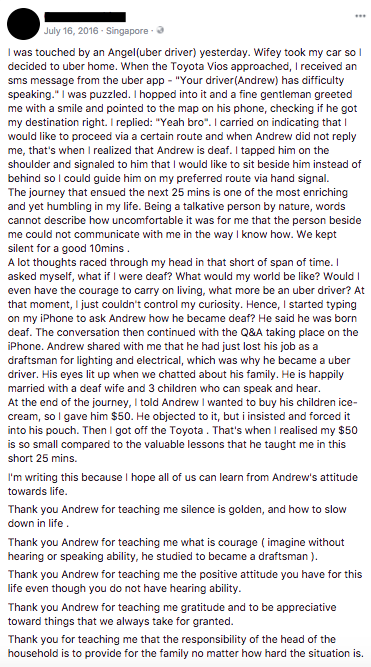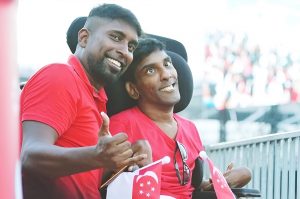In July last year, a Facebook post in which a man detailed his encounter with a deaf-mute Uber driver went viral. He described how, upon securing his ride, he was surprised to be told that his driver might have difficulties communicating.
On getting into the car, he realised why, and proceeded to ask his driver many questions relating to his life and experience as a deaf-mute person. Before he alighted, he offered the driver $50 to buy his children ice-cream, as though this wasn’t something he could afford to do on his own.
The driver refused, but the man “forced” the money into his pouch and alighted.
After describing what happened, he goes on to gush about the “valuable lessons that he taught me in this short 25 mins”, as though his driver was not a person but a thing that existed only to educate him on appreciating everything he had thus far taken for granted.
Despite how his post garnered 6906 shares and comments gushing about what an inspirational moment this was, I still recall the two emotions I felt at the time: anger and disgust.

As a result, his school wanted wanted to celebrate him. But when he told reporters that he aspired to be a “vfx artist and a game designer”, he says that his teachers found his answer unsatisfactory. To cut a long story short, he found himself nudged into a neat, unimaginative, yet distinctly Singaporean narrative about an autistic student who aspired to be a doctor.
While many who saw, shared and commented on Joseph’s post saw this as an opportunity to criticise the government, a bigger issue has gone undiscussed. Namely, that of our tendency to manipulate the stories of the disabled to create inspirational soundbites.
On the subject of the disabled being held up as stories of inspiration, he tells me, “Disabilities may be a catalyst for inspiration and stories. I see no harm in adapting such into narrative. Anything can be used for inspiration really, it’s a natural thing to marvel at someone climbing to the top against all odds.”
When I then ask if he truly believes that using disabled individuals to to inspire able-bodied people is genuinely dignified, he adds, “During my teens being accepted as normal was something I desired but as years went by I realised it was not a possibility. You can’t stop people from seeing you differently and culture has been shaped to glorify people who have made it against the odds. It’s been in our literature since the ancient times.
“People will always know you are different, the most important thing is that they treat you in a non-discriminating way in all fairness. That’s as close as it gets and its good enough for me.”
See what I mean? Extremely balanced.
But this is also where Joseph and I disagree.
It’s a perspective I love, mainly because I grew up with a disability of my own. While it has made life inconvenient at times, and caused me to spend much of Primary School being accommodated for in the most mundane of situations, it hasn’t prevented me from living like any other human being.
At times, I simply wondered why it was that the environment around me so clearly overlooked the needs of the handicapped.
And so when Young, who was born with Osteogenesis imperfecta, says that she learnt to use her body to the best of its capacity “just as you have”, it makes complete sense.
“That’s the thing about those kids in those [internet memes] as well,” she emphasises, “They’re not doing anything out of the ordinary. They are just using their bodies to the best of their capacity.”
In the same way, the Uber driver I mentioned at the start of this article wasn’t doing anything incredible. He was just making an honest living in the way he knew best.
So when someone comes along and says, “imagine without hearing or speaking ability, he studied to became a draftsman”, it’s both absurd and patronising (read: insulting). There is no dignity in giving this man charity simply because learning was more challenging for him as compared to the average, “normal” human being.
As such, it’s important to realise that when a person in a wheelchair is unable to climb a flight of stairs, this is only because the path from the first floor to the second was not designed with people like him in mind. That’s all. It’s no reason to feel sorry for them.
Like Young says, disability alone does not make anyone exceptional. And we need to understand this because it makes all the difference between respect or pity.
Joseph shares with me that when he first wrote his Facebook post, it was for a Facebook group where parents of autistic children share their experiences.
“The post was part of my response to talk to these parents out of sheltering their children from reality. Reality isn’t that forgiving, I brought up my own case study as an example to these parents about the rude shock I received expecting things to go my way because I worked for it,” he says.
“The world isn’t fair and many who worked the part never get their say in things. I didn’t want these parents to go about giving in to their kids all the time, telling them everything is perfect and everyone will accept them because it simply is not.”
For a moment when I was reading this, I forgot that he was referring to children with autism. Rather, this reality check sounded like something completely universal, something that all of us learn to deal with at some point in our lives.

Some will argue that there are varying states of disability, and there are clearly situations in which one might need help. In such instances, of course you should help them. But also, when it’s clear that someone is okay on their own, just let them be.
The thing is, we are all different. Some of us are really awkward in social situations, and some of us do badly in sports because of shitty hand-eye coordination. And then some of us happen to be disabled.
That’s just life. There’s no need to make a big deal out of it.
Many will still disagree with me at this point, but I genuinely believe that the disabled do not exist to inspire us. We might be impressed when they overcome seemingly overwhelming odds, but we should also acknowledge this like we would anyone else’s achievements—with respect and recognition, not charity or excessive patronising.
While Joseph says that inspiration can be found anywhere, I still can’t help but wonder: if it really takes someone born with so much less than you to make you realise what you’ve taken for granted, what does that say about you?
Why isn’t it the able-bodied individuals around you with great work ethic or generous characters who inspire you?
Today, when I think about that Uber driver and the man he encountered, I still feel angry. On one hand, I’m appalled that the man would force money on him, and not even stay to find out if this was what he really wanted.
But more than anything, when he goes on to list the various things he learnt from his encounter, these don’t sound like lessons. Instead, it looks like a laundry list of basic things (ie. “gratitude” and “responsibility”) that he seems to not have known were important in the first place.
And to me at least, this lack is what’s worth reflecting on, not the fact that a disabled person he ran into has managed to live life on his own terms.






